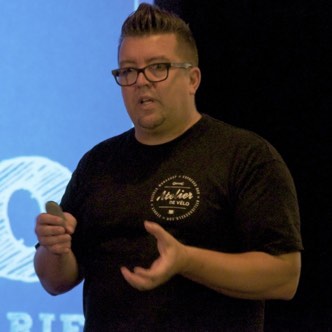Idea of the Week – Craig Sharkie
 Craig Sharkie’s presentation at our Respond conference was on how viewport units can make web typography responsive. And a great talk it was.
Craig Sharkie’s presentation at our Respond conference was on how viewport units can make web typography responsive. And a great talk it was.
But when we asked him to write an article for our new Scroll magazine, Sharkie went off at a bit of a tangent. He refers in the talk to “contextomy”, the word for taking something out of context, changing its meaning.
His article explores that further, digging into how changes in context can affect search results and ultimately what we think of as knowledge and truth. We’ve made that our Idea of the Week.
You can also read this article in the first edition of our rebooted Scroll Magazine.
Searching for Truth
by Craig Sharkie
You can google it. You can bing it. You can even let me google that for you. Google themselves would prefer that you didn’t google it. And Yahoo would love anyone to have yahooed it.
“It”, of course, is using a search engine, and we’ve all done it. In all likelihood, everyone you know has done it, although you probably see a handful of people each week that haven’t, and wouldn’t.
Figures show that 86.9% of Australians are computer literate, which is well above the global computer literacy rate of 39.0%, and safely under the Australian literacy rate of 96%. I know all those figures because I googled them. And Google happily gave me 2,870,000 results, in a breathtaking 0.51 seconds.
And we don’t question that. Although perhaps you’re starting to, now. We’re comfortable receiving our search results in batches of 10, and if we make it 10 pages deep in a search, there’s something awry.
When Jerry Yang and David Filo launched Yahoo last century, it was a search directory and not a search engine. That just meant that human beings made recommendations about what would be the best results for your search, and not a Web bot with a flashy algorithm.
And somewhere along the line we traded human input for a spider’s index.
If you’re familiar with the genre you’re searching, and can recognise key personalities in your results, you actually start to apply some directory filtering back over the bot’s results.
Interested in Web Development? If you see Mozilla Developer Network or the W3C in your results you’ll be confident you’re heading in the right direction.
Interested in Semantic Web Development and you’ll likely skip past W3Schools, but you’ll often take a look at Stack Overflow, just to be sure. Names like Paul Irish, Chris Coyier, Remy Sharp, Eric Meyer, and Peter-Paul Koch will make you more comfortable again. Although for two of those, CSS-Tricks and Quirksmode might be more familiar.
Search for “search?q=most+popular+search” and you’ll get 415,000,000 results in a quarter of a second, and there’s frankly no way for you to comprehend that much data in that small an amount of time. We’ve long ago traded quantity and speed for quality and fidelity. Voracity for veracity.
And if you take brands out of the mix – think Kardashians, Kanye, Kleenex, or My Kitchen Rules – and pornography from the mix – think … well you know what to think – the most searched for term in 2015 was “weather”.
45.5 million people per month searched for weather, and the smart money says folks wanted to know the forecast, and not the science behind the weather.
In our hunger for information we often overlook quality. We opt for common usage, over uncommon precision. And we’re happy to do it for searches as we’ve become used to doing it for so many other parts of our shared experience. We have precedent for it and we’re familiar with it, and it’s almost an expectation. Great minds think alike, after all.
And even the saying “Great minds think alike” has fallen victim to the race for more results. It’s become a contextomy – the selective excerpting of words from their original linguistic context in a way that distorts the source’s intended meaning. Ask Wikipedia what a contextomy is.
“Great minds think alike, small minds rarely differ” or “Great minds think alike, and fools seldom differ” are the directory versions, and the more idiomatic “Great minds think alike” is the search engine version.
Millions of people misquote this saying and in that misquotation change the meaning we take from the quote.
When we find answers that fit the shape of our question, and in the face of potentially millions of answers, we excuse ourselves from the need to investigate the answers too thoroughly. Often, there is little harm in our expedience; occasionally, though that expedience is the root of our lament.
Were we to take the time to investigate, the answer would be closer than we think, and more useful than we expect.
Allow yourself to only need an image search for “Great minds think alike” and you’d be told the saying originated in Ancient Greece. Don’t settle for the picture-telling-a-thousand-words option, and Google can lead you to a Stack Overflow result where you’d learn that the idiom wasn’t quite that old and likely comes from the 17th Century.
We don’t always need to go back to the source or specification to get the truth behind the answers we need, but we do need to be sure that someone has done the hard yards there for us. The answer that we desperately need might be the 11th result on Google and can save us hours of work.
Had Jesse James Garrett not been going back to the specification, he might not have been among the drive that saw Asynchronous JavaScript + XML push the use of the Internet in new directions.
Arguably, you don’t need to know that Garrett coined the term Ajax in the shower, but then that might be the information that’s your tipping point.
And, as they say, “the rest is science”.
Or do they?
Maybe we should google that.
Great reading, every weekend.
We round up the best writing about the web and send it your way each Friday.
